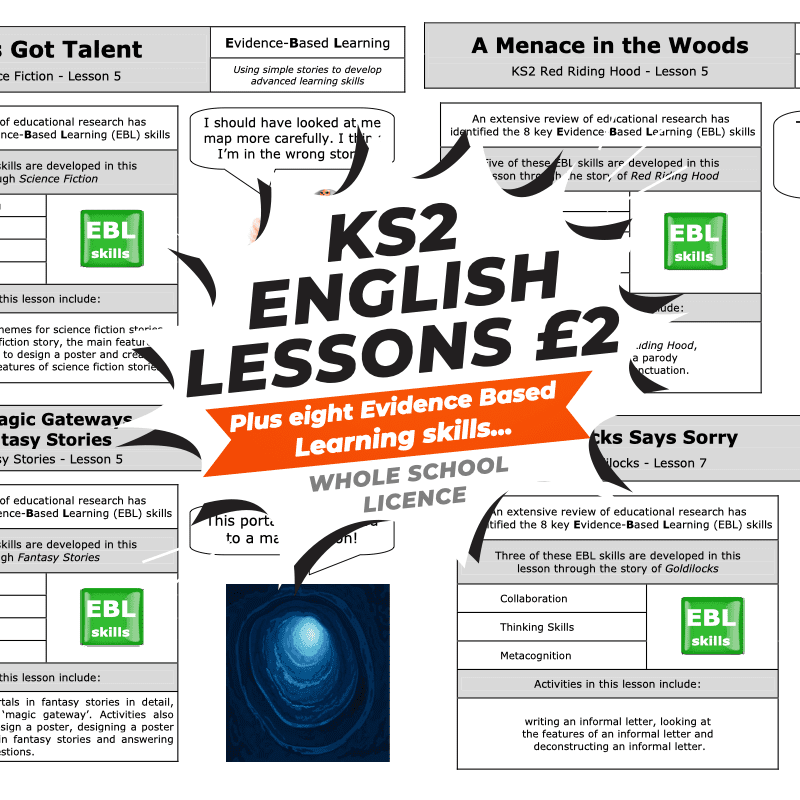

Free Evidence-Based Learning Science Fiction Lesson (PDF)

EBL lessons develop the thinking and learning skills necessary to maximize every pupil’s learning outcomes. You can see how EBL skills are developed by downloading this free EBL lesson.
August 26, 2023
No learner left behind. The 8 evidence-based learning skills will enable all learners to maximise their learning outcomes. Typically, each lesson develops at least three EBL skills – this lesson, for example, develops collaboration, thinking skills, self-regulation and peer teaching.
No teacher or school left behind. A whole-school licence means that these lessons are easy to share among teachers. These lessons are also ready-to-use with no teacher preparation needed. As a bonus most lessons also include a five-minute CPD activity for teachers based on one of the EBL skills developed in that lesson.
Free Evidence-Based Learning Romans Lesson (PDF)

This EBL lesson summarises the nine reasons why Caesar invaded Britain in 55 BC. This is the history bit. It also provides pupils with the chance to learn report writing. This is the English bit. More importantly, however, it also presents pupils with chance to master self-regulation which is a key evidence-based learning skill.
August 26, 2023
No learner will be left behind. Mastering self-regulation will give pupils a skill for life.
This EBL lesson, like all our lessons, is ready-to-use immediately because, for teachers, it is a preparation free resource. So in essence this lesson is a ‘minimum input, maximum learning’ resource.
Free Evidence-Based Learning Grammar Lesson (PDF)

In this lesson pupils work with a partner to make some brief notes about Noun Phrases. Ideally, pupils should make a note of only the essential aspects of this topic – say 5-6 main points (with examples). These notes are important because they will be used as a basis for peer teaching and making a video on this topic in part 2.
August 26, 2023
This lesson has been written to enable to enable pupils to teach themselves without teacher input because each page has been carefully designed to nudge pupils’ learning forward.
Collaboration – Free 15 minute Teacher Guide (PDF)
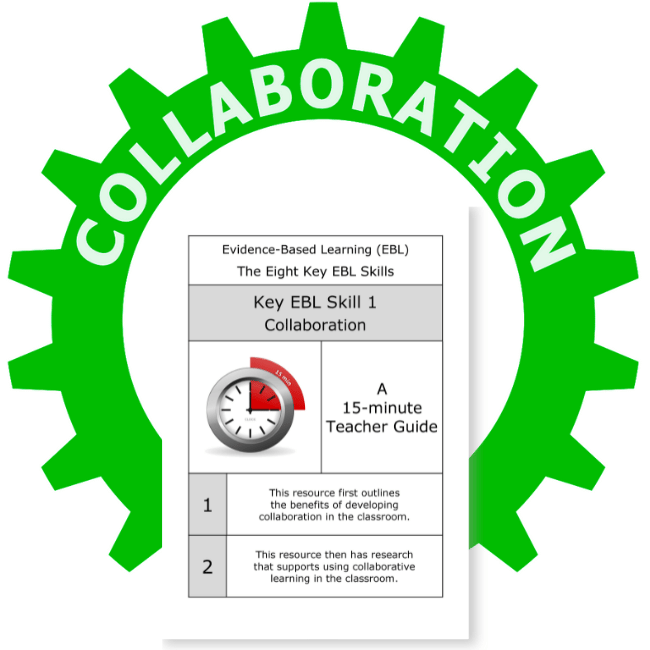
This 15 minute teacher guide outlines the key benefits of collaboration. It also gives a brief overview of some of the research which underpins collaboration and which highlights collaboration’s place as a key evidence-based learning skill.
Sept 6, 2023
“When learners work together, they achieve more than they do as individuals, and they are more productive.”
“Collaborative learning has been shown to enhance learners’ motivation, engagement, and overall academic achievement.”
Thinking Skills – Free 15 minute Teacher Guide (PDF)

This 15 minute teacher guide outlines the key benefits of thinking skills. It also gives a brief overview of some of the research which underpins thinking skills and which highlights thinking skills’ place as a key evidence-based learning skill.
Sept 6, 2023
“Developing pupils’ ability to think more skilfully can lead to better learning and increased attainment.”
“Far and away the most effective factor in raising attainment was activity that made pupils’ minds work.”
Peer Assessment – Free 15 minute Teacher Guide (PDF)

This 15 minute teacher guide outlines the key benefits of peer assessment. It also gives a brief overview of some of the research which underpins peer assessment and which highlights peer assessment’s place as a key evidence-based learning skill.
Sept 6, 2023
“Pupils use peer assessment to provide feedback to other pupils in relation to the quality of their work. Peer assessment encourages collaborative learning and swapping ideas. This helps pupils to develop a number of critical skills. The learning process is enhanced and pupils gain a sophisticated grasp of the learning objectives.”
“Pupils learn a lot from their peers so using peer assessment increases opportunities for learning. This encourages pupils to take ownership of their learning and be more involved in the learning process. Another benefit of peer assessment is that it makes the assessment process more clear.”
Peer Teaching – Free 15 minute Teacher Guide (PDF)
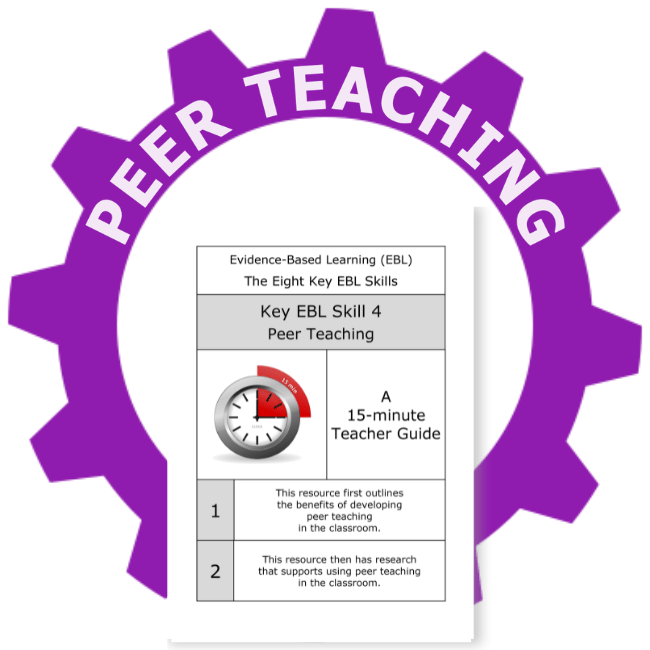
This 15 minute teacher guide outlines the key benefits of peer teaching. It also gives a brief overview of some of the research which underpins peer teaching and which highlights peer teaching’s place as a key evidence-based learning skill.
Sept 5, 2023
“Probably, the biggest benefit of peer-to-peer learning is that it has a significant effect on improving academic achievement for learners.”
“In short, it offers the right learning support that ultimately improves the learner’s learning.”
“It is not only that learners are studying together, but it’s also that the peer teacher is fine-tuning their own skills by teaching the peer learner the subject.”
Self-Assessment – Free 15 minute Teacher Guide (PDF)
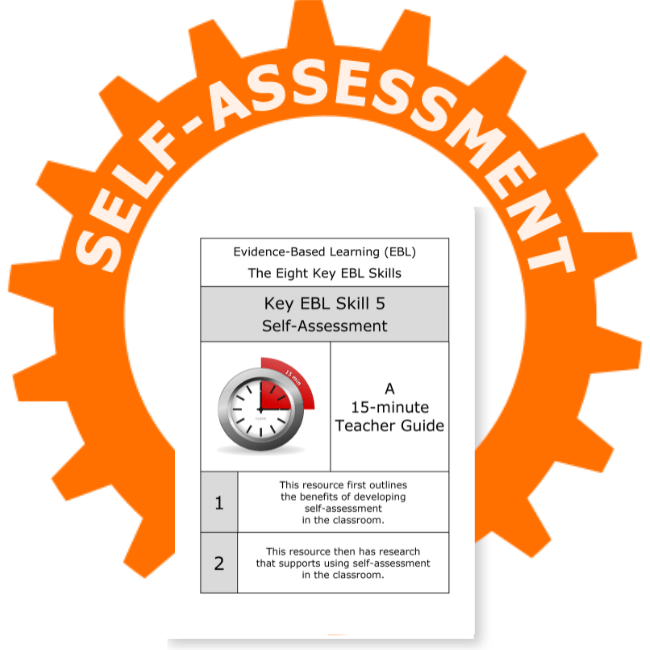
This 15 minute teacher guide outlines the key benefits of self-assessment. It also gives a brief overview of some of the research which underpins self-assessment and which highlights self-assessment’s place as a key evidence-based learning skill.
Sept 5, 2023
“There is ample evidence that suggests that self-assessment has a positive impact on pupil learning. It can improve performance, strengthen motivation and self-regulation, it can improve feedback literacy and it can promote the development of evaluative judgment, and foster reflection and life-long learning.”
“Self-assessment requires learners to make judgements about their own work, identify the gaps between their current performance and the desired standard and take actions to close the gaps.”
Metacognition – Free 15 minute Teacher Guide (PDF)
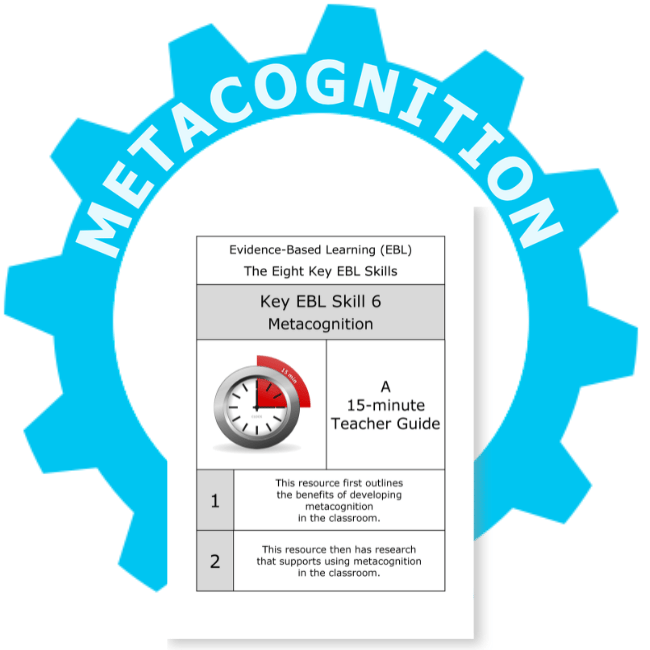
This 15 minute teacher guide outlines the key benefits of metacognition. It also gives a brief overview of some of the research which underpins metacognition and which highlights metacognition’s place as a key evidence-based learning skill.
Sept 2, 2023
“Teaching pupils about metacognition – or thinking about their thought processes – often provides the tools necessary to turn mediocre or failing academic performance into excellent performance. When pupils are taught how to learn, their performance usually takes an immediate and dramatic turn for the better.”
Self-Regulation – Free 15 minute Teacher Guide (PDF)
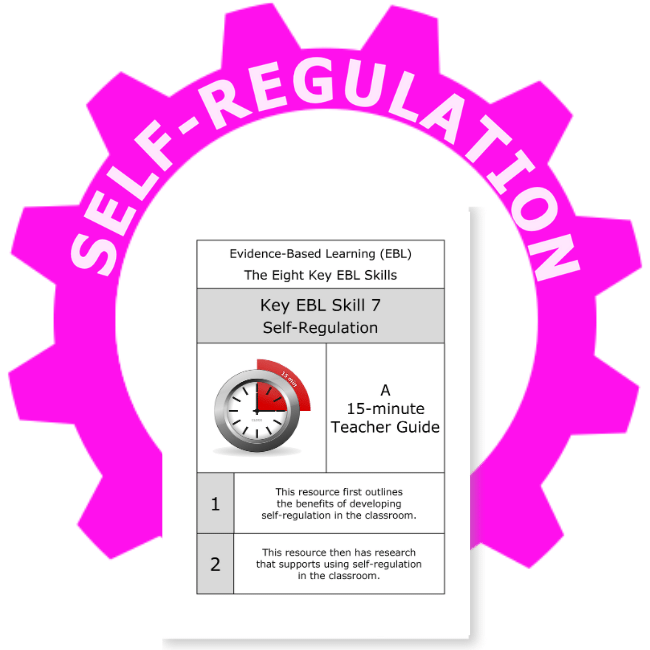
This 15 minute teacher guide outlines the key benefits of self-regulation. It also gives a brief overview of some of the research which underpins self-regulation and which highlights self-regulation’s place as a key evidence-based learning skill.
August 23, 2023
“Self-regulation refers to the degree to which pupils can regulate (control) aspects of their thinking, their motivation and their behaviors during learning.”
Independent Learning – Free 15 minute Teacher Guide (PDF)
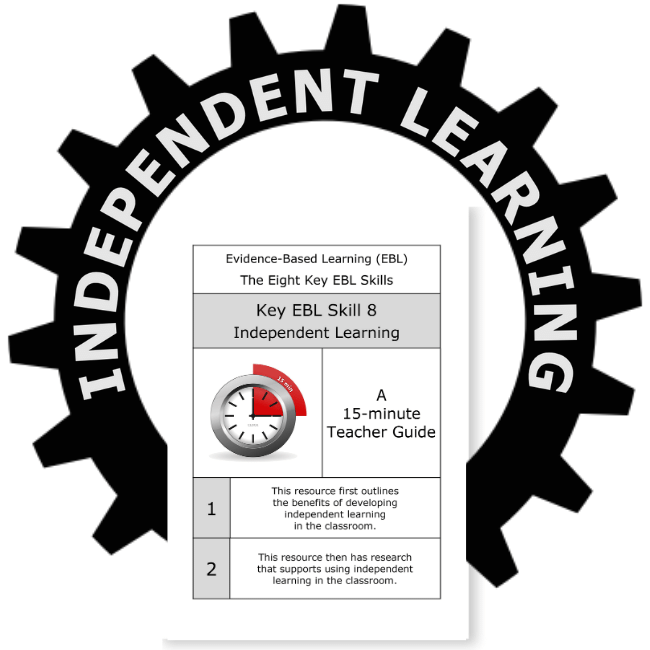
This 15 minute teacher guide outlines the key benefits of independent learning. It also gives a brief overview of some of the research which underpins independent learning and which highlights independent learning’s place as a key evidence-based learning skill.
August 8, 2023
“An independent learner is a learner who takes the lead in their own learning .”
“Independent learners take responsibility for their own learning, they know how to learn and they are aware of different strategies for learning. Independent learners are intrinsically motivated by making progress in learning.”
Free Evidence-Based Learning Brochure (PDF)
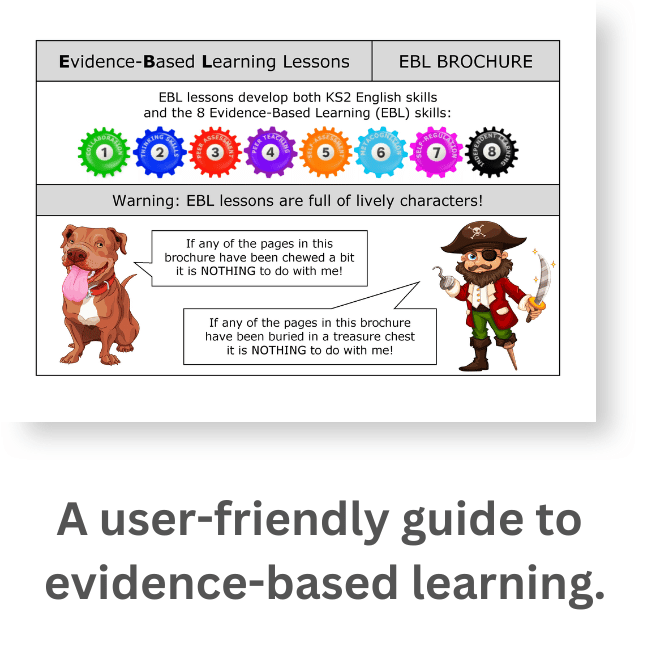
This EBL brochure is all you need to understand why Evidence-Based Learning is the future of education and why the EBL lessons available on this site are the future of learning.
August 13, 2023
No learner left behind. The 8 evidence-based learning skills will enable all learners to maximise their learning outcomes. Every EBL lesson will develop at least 3 EBL skills.
No teacher or school left behind. These EBL lessons are ready-to-use with no teacher preparation needed. A whole-school licence means that these lessons are easy to share among teachers and the 50% discount will put these lessons within reach of most school budgets.
Free Evidence-Based Learning Grammar Peer Teaching (PDF)

Working with a partner, pupils made brief notes on Noun Phrases in part 1. The same pair should now be ready to make a presentation on this topic to another pair. In return this other pair will also make a presentation (on the same topic) back to them. In this process, all four pupils experience peer teaching and being peer taught thereby creating four “experts”. There is a suggested page of notes included in this part for pupils to check their own notes against before they peer teach this topic to each other.
Sept 11, 2023
These four experts then combine the best bits of both of their presentations to create a short video about Noun Phrases. This video will form part of a library of grammar topics to be shared among the class.
Free Evidence-Based Learning Grammar Self-Assessment (PDF)

Having made notes with a partner (part 1) and experienced peer teaching (and peer learning) and making a video (part 2) in a group of four pupils should now be ready to work on their own. After answering the questions pupils then self-assess their own work. The idea is to check that pupils’ individual understanding of Noun Phrases is secure.
Sept 11, 2023
After completing this question and answer self-assessment unit pupils are in a position to see whether they are a purple monster (peer learner) or a green monster (peer teacher) of this topic. Purple monsters should be encouraged to watch videos on this topic.
Free 5 x Reasons to Start a new Paragraph (PDF)

This set of five short activities – 8pp each – allows pupils to learn the five reasons for starting a new paragraph one reason at a time. Each resource can be dowloaded from the links below or from the descriptions underneath.
Oct 24, 2023
Resource 1 explores the first reason – when something new happens in a story.
Resource 2 explores the second reason – when the setting in a story changes.
Resource 3 explores the third reason – when the time in a story changes.
Resource 4 explores the fourth reason – when a new character appears in a story.
Resource 5 explores the fifth reason – every time someone speaks.

